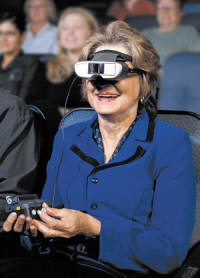HANDS ON - Focus On Low Vision
Reaching Seniors
by Erinn Morgan
While having a low vision practice can rank high on the personal satisfaction scale, it can be a challenging business to grow.
Many practitioners speak of difficulties in increasing their existing patient base. "It's the hardest part of this business," says Joseph L. Fontenot, MD, a heart-surgeon-turned-low-vision-specialist located in Fair Hope, Ala.
|
|
|
|
Eschenbach's Noves Bino magnifiers |
|
"The patients are not aware of what's available--even some of the doctors are not aware of what's available. It's a problem getting the patients to show up. Once they do show up, however, they are happy," he says.
There are a few basic strategies that low vision experts employ to help build their business, patient by patient. Some ECPs have specific outreach techniques, while some use several tactics to let seniors know about low vision.
"I have talked to Lion's Clubs, the Masons, and church groups--I've done everything except stand out on the street corner," says Fontenot, whose practice is two years old.
Here, we offer six strategies used by those who work in low vision.
1. UTILIZE P.O.P.
One way is to utilize point-of-purchase (P.O.P.) materials. Posters have proven to be effective tools at Medical Vision Technology in Sacramento, Calif.
"We have a poster that we put up in our [six] offices of an Olympic gold medalist standing with his grandfather who is wearing the EVS Jordy," Ronald Cole, MD, says. "We have placed a pocket on the poster to hold a brochure about our services and what people can expect from their visit.
"My feeling is you need to do something dramatic," he adds. "If you do the same old thing, people don't even look twice."
2. SPEAK AT LOCAL CLUBS
Another method used by low vision specialists is to touch base through local clubs and organizations, senior centers, assisted living centers, and churches.
"Certainly, going to senior centers and letting them know about your services makes a big difference," says Bruce Gilliland, OD, of The Low Vision Center in Knoxville, Tenn. "It is important for them to know there is someone who can help."
3. PLAN SEMINARS
The Low Vision Center also organizes an educational seminar on a yearly basis that explains the major low vision issues to the local community.
"It is about three hours long--we have a retinal specialist speak on a topic like macular degeneration, a guest speaker, and I speak on low vision," he says.
"We try to choose a venue that is local and can hold 200-plus people and spend a month or two prior sending out flyers to other practitioners' offices, to our current patient base who might benefit, and to nursing homes, senior centers, and assisted living centers," he adds.
|
|
|
|
Enhanced Vision Solution's Jordy--a head-worn magnifier |
4. CONTACT THE MEDIA
Others have reached out to the media for attention.
"I have had articles in the local paper. I have been on the radio. I have also been on local and national TV," says Fontenot, who has appeared on NBC's "Today" show.
5. MEET OTHER DOCTORS
Some say the most successful strategy is to make other doctors aware of your low vision services.
"I mainly get referrals from physicians, trauma centers, and some geriatric centers," says Paul Freeman, OD, of Allegheny General Hospital in Pittsburgh.
"I also talk to podiatrists, gerontologists, and diabetologists about our services," he adds. "It is important to talk to those who see seniors all the time. I think going to support groups has a limited outreach."
6. WRITE FOLLOW-UPS
Another way Freeman solidifies his relationships in this area is to follow up the patient's visit with a letter of report to the referring physician, the patient's primary care physician, and anyone else who would benefit.
"I summarize what happened at my examination of the patient," he explains. "If the patient is happy and the treatment is successful, that acts to stimulate more referrals."
This can be more effective than visits to local centers, he adds. "Some think 'I'll go to senior centers and pass cards out,' but the population has become more sophisticated, and the doctors have got to demonstrate success, not talk about it," he says.





